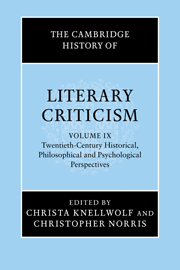Book contents
- Frontmatter
- Introduction
- HISTORY
- MARXISM AND POST-MARXISM
- FROM CULTURAL POETICS TO CULTURAL STUDIES
- PSYCHOANALYTIC APPROACHES
- GENDER AND SEXUALITY
- 15 The history of feminist criticism
- 16 Feminism and deconstruction
- 17 Gay, lesbian, bisexual, queer and transgender criticism
- COLONIALISM, POST-COLONIALITY, NATION AND RACE
- MODERNITY AND POSTMODERNISM
- PHILOSOPHY, AESTHETICS AND LITERARY CRITICISM
- INTERDISCIPLINARY APPROACHES
- Bibliography
- Index
- References
16 - Feminism and deconstruction
from GENDER AND SEXUALITY
Published online by Cambridge University Press: 28 March 2008
- Frontmatter
- Introduction
- HISTORY
- MARXISM AND POST-MARXISM
- FROM CULTURAL POETICS TO CULTURAL STUDIES
- PSYCHOANALYTIC APPROACHES
- GENDER AND SEXUALITY
- 15 The history of feminist criticism
- 16 Feminism and deconstruction
- 17 Gay, lesbian, bisexual, queer and transgender criticism
- COLONIALISM, POST-COLONIALITY, NATION AND RACE
- MODERNITY AND POSTMODERNISM
- PHILOSOPHY, AESTHETICS AND LITERARY CRITICISM
- INTERDISCIPLINARY APPROACHES
- Bibliography
- Index
- References
Summary
Feminism and deconstruction have influenced literary criticism by rethinking the terms of sexual difference, politics and ethics. Emphasising indeterminacy, the openness of interpretation and the importance of difference, their alliance has given rise to powerful interrogations of representations of women across a range of literary fields.
While the alliance between feminism and deconstruction is acknowledged by literary criticism, there is not a simple formula for how they work together. Their relationship takes a variety of shapes, partially because feminism and deconstruction continuously redefine one another. The resulting instability produces a fluid relationship, in which neither term is subordinated.
It is important to note, though, that however many shapes it has the potential to take, the alliance between feminism and deconstruction was initially met with scepticism. In what is probably one of the clearest statements he has ever made, Jacques Derrida claimed that ‘deconstruction is certainly not feminist … if there is one thing that it must not come to, it's feminism’. For Derrida, feminism ‘is the operation through which a woman desires to be like a man, like a dogmatic philosopher, demanding truth, science, objectivity’. Feminism is therefore accused of eliding difference and judged to be just another form of western metaphysics, pinning its hopes on truth and objectivity.
If Derrida has tried to push feminism away from deconstruction, a number of feminists have also attempted to push deconstruction away from feminism, although for a different set of reasons. Deconstruction is against feminism, according to Denise Riley, because it has ‘no political allegiances’.
- Type
- Chapter
- Information
- The Cambridge History of Literary Criticism , pp. 207 - 216Publisher: Cambridge University PressPrint publication year: 2001

